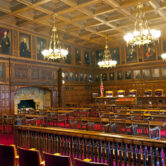FAIRFAX, Va. (CN) — The ex-husband of a woman in a court fight over possession of the former couple’s frozen embryos Tuesday recounted episodes in which he discovered that she had left her toddler son in a parked car.
During the second day of testimony, the Fairfax County Circuit Court judge presiding over the trial also sparred with the woman's lawyer over the legal underpinnings of her case: whether embryos can be partitioned — valued, divided and even sold in the manner of property.
But much of the day focused on Jason Heidemann, an attorney adviser for the U.S. Trade Commission, whose ex-wife, Honeyhline Heidemann, has asked the court for a legal partition granting her the two frozen embryos from the couple's marriage. The fertility treatment aided the couple in producing one child, Emma, 7, before the couple divorced in 2018. But Mr. Heidemann objects to his ex-wife's plans to have more of his genetic children.
Two therapists called as witnesses have testified that Ms. Heidemann was under stress as a cancer survivor and new mother. They also found her truthful during sessions. But on the witness stand, Mr. Heidemann described his ex-wife as a volatile, unpredictable woman who believes North Korea or China is hacking her computer.
After their divorce, she had two other children, Ezra, 2, and Ella, an infant. While Mr. Heidemann is not the genetic father of those two, he is familiar with them. On two occasions, he said, she left the boy, Ezra, in the car with the window cracked. On the first occasion, the car was hot and the child was perspiring and unconscious. Mr. Heidemann made a video of the second incident, which was shown in court.
Under questioning by his attorney, Carrie Patterson, Mr. Heideman recounted that his former wife became infuriated when he asked to take his daughter, Emma, to visit his mother. He recorded that incident, as well, and it was also played in court.
During the recording, Ms. Heidemann is heard saying: "Why don't they ask my permission?"
"I am Emma's father," Mr. Heidemann responded.
"You cannot take my daughter," she screamed. "Over my dead body." At another point, she said, "kill me."
He announced that she had a knife and pleaded with her to drop it.
She responded that she was going to get a gun so that she could die.
As the recording played in the courtroom, the sound of the couple's young daughter could be heard in the background. Child protection officials were called in as a result of the incident.
The Heidemanns have been in and out of court since their 2018 divorce, when the disposition of the frozen embryos surfaced as an issue.
Through their fertility clinic, they had agreed that unused embryos could go to another patient and her partner. Later, the couple's divorce settlement made status-quo provisions for the embryos. "Pending a court order or further written agreement of the parties as to the disposition of the aforesaid embryos, the parties agree that neither of them will remove such embryos from storage."
Ms. Heidemann later attempted to reopen the divorce in an unsuccessful effort to get the embryos. Lawyers then filed another case — a partition. It is a novel use of the law and a case of first impression in Virginia.
In a controversial ruling on the issue last fall, Judge Richard Gardiner wrote that human embryos are "chattel" based on his historical research into laws that were also used in regard to enslaved persons.
Gardiner’s opinion asserted, “as there is no prohibition on the sale of human embryos, they may be valued and sold and thus may be considered goods and chattels” within the meaning of the law. That enabled the case to move forward as a legal partition — but for embryos, as opposed to real estate.
Ms. Heidemann's attorney, Jason Zellman, has on several occasions pointed out that the case is a partition — not family law. He has also said Gardiner's decision is the law in this case.
In court Tuesday, Judge Dontaè L. Bugg, who is presiding over the case, pushed back.
“Don’t I have to have evidence that they can be valued and sold?” Bugg asked. “Where is my evidence that they can actually be sold?”
The judge pointed out that if he purchased a diamond, it would be possible to compare costs and determine the value. It's different with embryos — although the infertility treatments can cost thousands and couples must pay a monthly storage fee.
When Bugg leaned in, demanding some evidence that the embryos could be sold, Zellman said: “Obviously, I have difficulty if the court doesn’t consider embryos as property."
Zellman rested his case for Ms. Heidemann Tuesday. The trial continues Wednesday.
Subscribe to Closing Arguments
Sign up for new weekly newsletter Closing Arguments to get the latest about ongoing trials, major litigation and hot cases and rulings in courthouses around the U.S. and the world.








